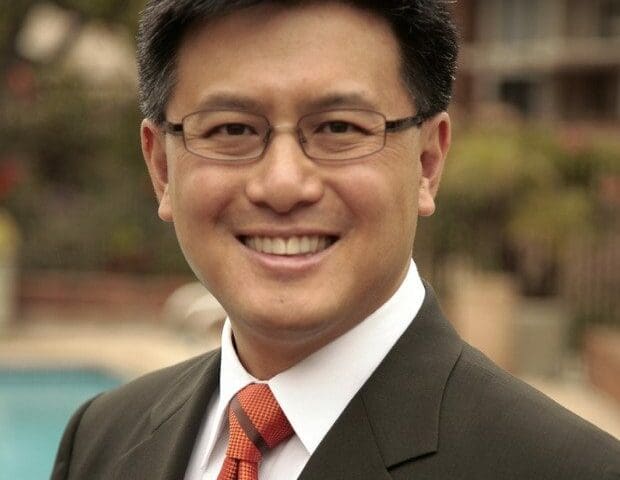

Capital & Main recently looked at a spate of negative headlines about public pension funds, spurred by data that State Controller John Chiang released on his new public data site at ByTheNumbers.sco.ca.gov.
Chiang has served as Controller since 2006, acting as California’s Chief Fiscal Officer. He was recently elected as State Treasurer and will switch to that office next year. In both roles, Chiang sits on the Boards of Administration for the two largest public employee funds, California Public Employees’ Retirement System (CalPERS) and the California State Teachers’ Retirement System (CalSTRS).
Capital & Main followed up with the Controller to ask about the state of pension systems in California and how those systems should be looking to the future.
The data you posted on your By the Numbers site led to many existing critics of pension saying “See?
» Read more about: Controller John Chiang on the Future of California’s Public Pensions »
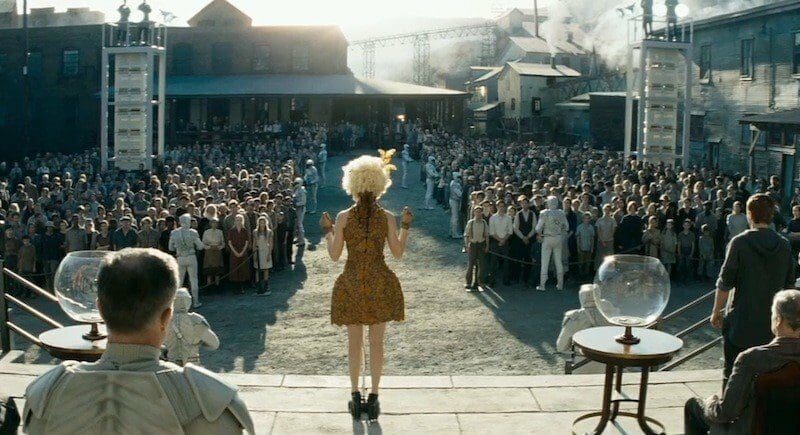

In The Hunger Games, the rich and politically powerful rulers of the capital city Panem force young people from 12 districts to fight against each other. The Games serve the interests of the ruling elite by ensuring a quiescent populace remains that way, while 23 of the 24 young combatants are meant to wind up dead.
Good dystopian sci-fi holds up a mirror to reality, sometimes despite itself. It is unlikely that either trilogy author Suzanne Collins or Lionsgate – the producer and distributor of the film series – had Hollywood in mind, but the films provide an excellent description of the economics of today’s movie industry, as states compete with each other to give away ever more taxpayer dollars in exchange for jobs that, in some cases at least, they don’t even get.
As a new LAANE report details, every year approximately 40 U.S.
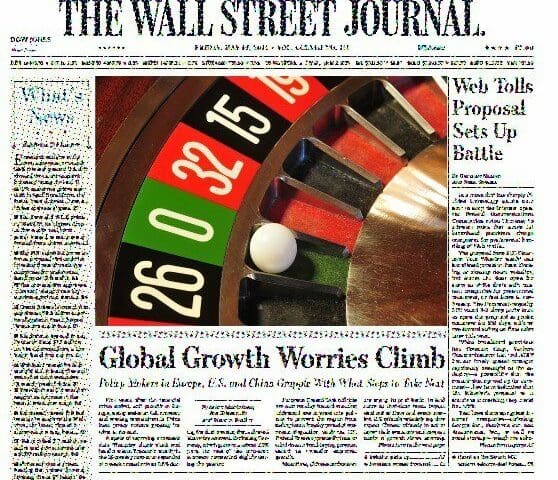

“Public Pensions Need Gamblers Anonymous,” blared the op-ed by the American Enterprise Institute’s Andrew Biggs in the Wall Street Journal last week.
Can it be true? Did the trustees of CalPERS just take retirement funds for 1.7 million Californians – backed up by our tax dollars – to Las Vegas and put it all on black?
Of course not. Biggs is probably talking about speculating through black box investments and shadowy hedge funds, right?
Wrong again. The risky investing strategy we are warned against: the stock market.
As a measuring stick, Biggs trots out the “100 minus age rule,” which says that an individual should invest no more than that percentage amount in stocks and other so-called risky assets. (So a 30-year-old might have 70 percent of his or her investments in stocks and 30-percent in things like bonds,
» Read more about: Pension Cutter Confuses Stock Market With Las Vegas »


With tongue firmly planted in cheek Thursday, a beaming Los Angeles Mayor Eric Garcetti credited two secret weapons for helping him break a deadlock among a labor coalition, civic groups, Kinkisharyo International LLC and the city to craft a compromise to save jobs and keep construction of new light rail cars in Palmdale: “bad pizza and smaller meeting rooms.”
Garcetti also serves as chair of the county’s transit authority, Metro. His self-deprecating quip garnered a hearty laugh while setting the tone for a mostly celebratory morning press conference to announce the new agreement before Thursday’s regular Metro board meeting.
In addition to the mayor and Kinkisharyo reps, news conference attendees included L.A. County Supervisor Mike Antonovich, Palmdale Mayor Jim Ledford Jr., Executive Secretary-Treasurer of the Los Angeles County Federation of Labor Maria Elena Durazo and Antelope Valley business group leaders.
All of the speakers heaped praise upon Garcetti for taking the lead in this 11th-hour process to broker the deal.
» Read more about: How Negotiators Erased Lines Drawn in the Sand to Create Jobs »
I recently sat down with actor Ed O’Neill, best known for his role as Al Bundy in the Fox TV Network sitcom, Married With Children, and who is currently starring in ABC’s award-winning comedy, Modern Family, which will be honored next week at the Los Angeles Alliance for a New Economy’s 2014 City of Justice Awards Dinner. Here’s the second in a series of clips from that interview. (Full transcript here.)
» Read more about: Watch Now: Actor Ed O’Neill on His Teamster Roots »
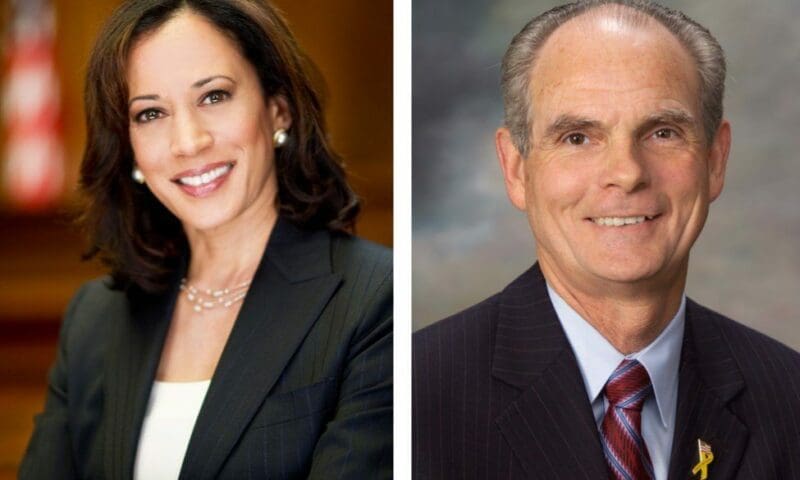

California pension cutters suffered another setback last week when a state appellate court rejected their claims that ballot language written by Attorney General Kamala Harris showed political bias.
The decision by Sacramento’s 3rd District Court of Appeal “dismissed as moot” San Jose Mayor Chuck Reed’s appeal of a lower court ruling. This effectively leaves in place Sacramento Superior Court Judge Allen Sumner’s March decision that Reed had failed to prove Harris’ ballot summary was misleading.
“We’re not going to get a hearing on the merits,” Reed told Capital & Main. “It shows how difficult it is to try to get through the court system in an election cycle; it means you have to start earlier.”
Legally, the two rulings sound a final death knell for Reed’s contentious statewide campaign to put his self-described Pension Reform Act of 2014 before California voters. In practical terms,
» Read more about: Pension Cutters Lose in Court, Vow 2016 Ballot Bid »


Little Joe had two cowboys, two kings and there was a third king face up on the table. They were playing Texas Hold’em and it had turned up on the flop—the first three cards laid down with two more to go. These were the common cards each player could try and make a hand. In Hold’em, you could play only one card of your two down ones or, if everybody had crap, all could play the five that eventually wound up in the middle of the table. At the moment, his three kings was a pretty good hand to have.
“I’ll see you fifty and I’ll bump it fifty,” Joanie Kriss said confidently. Of the three cards face up on deck, two were clubs. That might mean she had two clubs of her own and was chasing the fifth card in suit to make a flush … or was bluffing. The stakes were not Vegas level;
» Read more about: The Dixon Family Chronicles: “No Justice …” »


“California pension funds are running dry,” warned a recent Los Angeles Times headline.
“The unfunded liability— that’s the difference between promised benefits and projected funds to fulfill those obligations — grew from about $6.3 billion in 2003 to a little more than $198 billion in 2013,” Santa Rosa’s Press Democrat chimed in, helpfully doing the math to point out that’s a 30-fold increase in 11 years.
“The system, in short, is completely, utterly broken,” concluded the Orange County Register.
Despite nothing significant changing in the retirement plans themselves, public employee pensions are back in the news, and apparently panic is in the air.
Why? In late October State Controller John Chiang posted data on 130 state and local pension funds as part of his new By the Numbers website.
» Read more about: California Pensions: Encouraging News v. Scary Headlines »
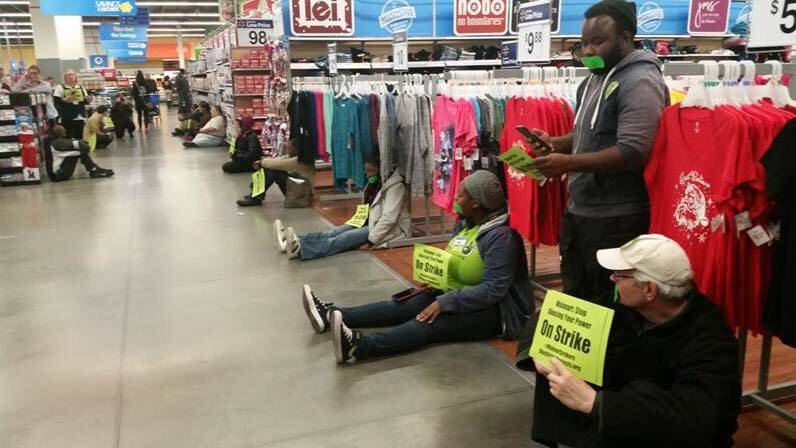

Walmart won’t pay its employees enough to afford Thanksgiving dinner, so they’re holding food drives for their employees. Seriously. It’s been reported that an Oklahoma City Walmart set up bins for underpaid associates to donate canned goods to other underpaid associates.
Walmart workers have a better idea: Pay us enough to put food on the table.
On Black Friday, the busiest shopping day of the year, tens of millions of Americans will travel to Walmart stores to look for holiday discounts on computers, toys and cellphones as well as to buy groceries and basic household items. But at more than 1,600 of Walmart’s 4,000 stores, shoppers will be greeted by Walmart employees handing out leaflets and holding picket signs — “Walmart: Stop Bullying, Stop Firing, Start Paying” and “We’re Drawing a Line at the Poverty Line: $25,000/year” — protesting the company’s abusive labor practices, including poverty-level wages, stingy benefits,
» Read more about: Black Friday Protests Push Back Against Walmart »
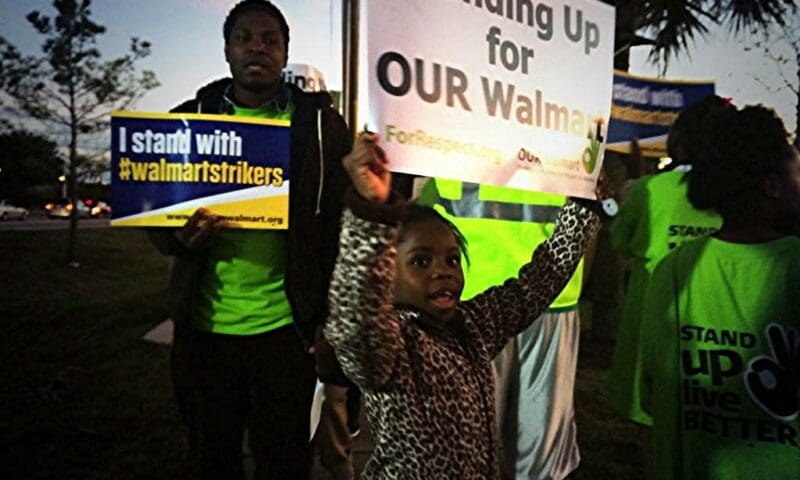

On November 13, Walmart associates in Los Angeles kicked off this year’s Black Friday strikes by sitting down in the aisles of the Crenshaw Walmart store to protest Walmart’s alleged intimidation. Later that evening 23 workers and community members were arrested at the Pico Rivera store.
But that’s just the beginning. This Black Friday, Walmart workers are striking again on the biggest shopping day of the year. Walmart associates are sick of struggling to get by while working for a company owned by the world’s wealthiest family. The Walton family that controls Walmart has more wealth than 43 percent of Americans combined, a perfect picture of everything that’s wrong with our unequal economy.
Walmart associates are striking to stop retaliation against workers who exercise their rights and to call on the company to publicly commit to paying $15 an hour and providing full-time work.
As Los Angeles and the Los Angeles Alliance for a New Economy (LAANE) work to raise the wage for all Angelenos,
» Read more about: Walmart Strikers: ‘All Out on Black Friday!’ »


From boiling the soon-to-be-mashed potatoes to rinsing the fruits and vegetables, clean water is an essential ingredient in every household that will be preparing Thanksgiving dinner.
And yet, the absence of adequate federal support means our public water systems are under threat. Over the next 20 years, U.S. water systems will likely require a staggering $2.8 to $4.8 trillion investment, and for-profit corporations such as Veolia and Suez are jumping at the opportunity to privatize America’s water supply so they can pocket a portion of those trillions we’ll need to spend.
A new report released by Corporate Accountability International with Public Services International Research Unit (PSIRU), shows that promises made by private water corporations fail to materialize or come at the expense of deferred infrastructure maintenance, skyrocketing water rates and risks to public health.
The good news, however, is that cities across the country and all over the world are increasingly rejecting water privatization and are taking back public control of their water systems.


In a dramatic turnaround to what only last month was described as a hopeless impasse, Los Angeles Mayor and L.A. County Metropolitan Transportation Authority (Metro) Chair Eric Garcetti announced Tuesday that an agreement has been reached between Kinkisharyo International, LLC and labor and community groups to expand its L.A. County manufacturing operations for its next delivery of Metro light rail cars.
The mayor’s office said the agreement will net the county a total of 250 new jobs as Kinkisharyo expands the light rail car assembly and testing operations at its existing plant in Palmdale. The accord also includes a “neutrality agreement” (stating Kinkisharyo won’t contest attempts to unionize its workforce), as well as a commitment to explore additional skills training and assistance for disadvantaged L.A. County workers.
The agreement covers a total of 175 cars slated for assembly at the facility, including the 78 that Kinkisharyo is currently assembling under a 2012 Metro contract,
» Read more about: Rail Car Pact to Bring Jobs to L.A. County »
Earlier this month I sat down with actor Ed O’Neill, best known for his role as Al Bundy in the Fox TV Network sitcom, Married With Children, and who is currently starring in ABC’s award-winning comedy, Modern Family, which will be honored in December at the Los Angeles Alliance for a New Economy’s 2014 City of Justice Awards Dinner. Here’s the first in a series of clips from that interview. (Full transcript here.)
» Read more about: Watch Now: Ed O’Neill on Pushing America’s Hot Buttons »


The two uniformed cops from Southwest Station who’d remained behind stood off to one side as residents of the Eden Arms and their neighbors continued to speculate about the shooting. Various theories were voiced but there was agreement of a sort on some facts derived from the eyewitnesses. A late model Toyota, or it could have been a Honda, rounded the far corner at a normal rate of speed. The vehicle slowed as it approached mid-block where the Arms was located. A smoked passenger window slid down some and a barrel of a gun was then rested on the window. Blam, blam, blam went the gunfire and the car roared away. The odd thing was, the weapon didn’t seem aimed at the few pedestrians around. Rather it seemed to be pointed upward.
The cops speculated the bullet that took out the window to the laundry room was a ricochet, possibly off the metal casing of the switch box on one of the telephone poles.
» Read more about: The Dixon Family Chronicles: “A Little Past Seven” »


Thanksgiving is our national food-focused holiday–but Los Angeles has an all-year-round reputation for food obsessions: Paleo diets. Veganism. Juicing. Fasting. Fusion food trucks, kimchi pizza, chorizo-filled potstickers with duck sauce reduction (yes, that is a real recipe).
What gets a lot less foodie press, though, is the City of Los Angeles’s innovation in creating one of the most progressive food policies in the nation.
Cities around the country have established programs to improve the availability of nutritious food for residents and set ethical and environmental standards for the suppliers to the multitude of public institutions that feed millions every year. In 2012 the city established the L.A. Food Policy Council to develop an equitable food policy for Los Angeles and to answer some key questions: How does a city that buys tons of food every year define “locally grown” food? How do purchasing policies sustain small farmers?
I recently interviewed one of the country’s unabashed progressive leaders, New York Mayor Bill de Blasio. Our discussion ranged from Ronald Reagan’s legacy to the failures of contemporary Democrats to stand up for their values. “We have an income inequality crisis in this country that will endanger the future of the entire United States of America,” de Blasio told me. We present here the first in a series of clips from that interview. (Full transcript here.)
» Read more about: Watch Now: Bill de Blasio on the Leadership Role of Cities »


It’s been more than 50 years since Cesar Chavez and Dolores Huerta founded the United Farm Workers union. In the ensuing decades, broader activism and increased awareness of the importance of those who grow and harvest our food have resulted in better wages and living conditions for some workers in our state and others, in spite of public indifference. The farmworkers’ story of struggle and of battles won (and those yet to be fought) are told in Food Chains, an unsparing documentary that screened Sunday at Laemmle’s Playhouse 7 in Pasadena under the sponsorship of the nonprofit Food Chain Workers Alliance.
The film chronicles the exploitation and brutal poverty — and in some instances, forms of enslavement— that plague American agriculture. Food Chains is directed by Sanjay Rawal, produced by Rawal, Smriti Keshari and Hamilton Fish, narrated by Forest Whitaker, and executive-produced by actress Eva Longoria and activist/filmmaker Eric Schlosser (Fast Food Nation);
» Read more about: American Gulag: A New Film Blasts Farm Labor Conditions »
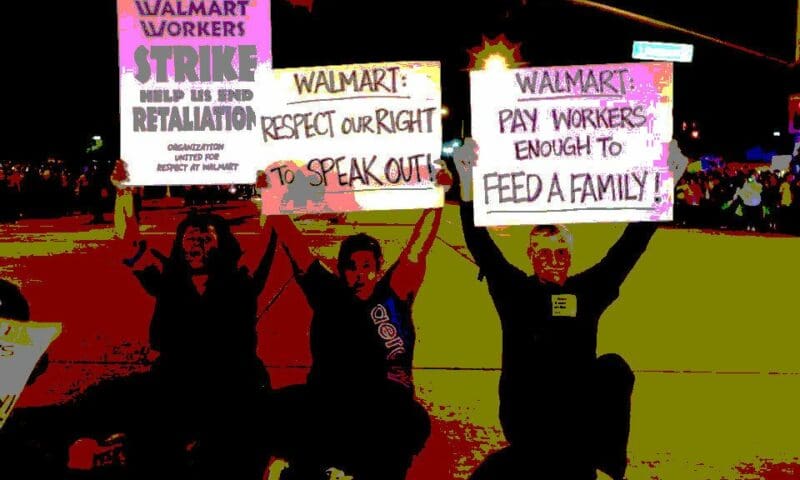

Earlier this month two dozen workers, clergy and other community folks sat down in the aisles of the Walmart store in Pico Riviera, then moved into the streets, where they were promptly arrested. Why would any group of people – much less some not even directly involved in working at Walmart– voluntarily put themselves in a situation they know will lead to their arrest? Because they feel the injustice of minimum wage jobs, whose schedules are unpredictable and deliberately fall just short of offering enough hours to provide health care benefits and paid sick days. These are among other practices that stores like Walmart refuse to rectify.
Without other ways to redress these grievances, people undertake nonviolent civil disobedience. They decide to deliberately break some small law rather than ignore a larger injustice, as Martin Luther King Jr. argued for during the civil rights movement. They break the law, but they are not criminals,


California voters passed a groundbreaking ballot measure this month that reduces penalties and sentences for nonviolent, “nonserious” crimes. Now, the private industry is responding to these changes in public attitudes and declining prison populations by opening up new lines of business.
A new report released by American Friends Service Committee (AFSC), Grassroots Leadership and the Southern Center for Human Rights, highlights the expansion of the private prison industry into other profitable and growing areas in the criminal justice system: prison and jail subcontracted medical care; forensic mental hospitals and civil commitment centers, as well as “community corrections” programs such as probation and halfway houses.
The report authors have named this new expanded private corrections industry the “treatment industrial complex” via the report.
As other states follow California’s lead and pass laws reducing mandatory minimum sentences, the report urges policy makers, advocates and others to ensure that private corporations can’t profit from any part of the criminal justice system.
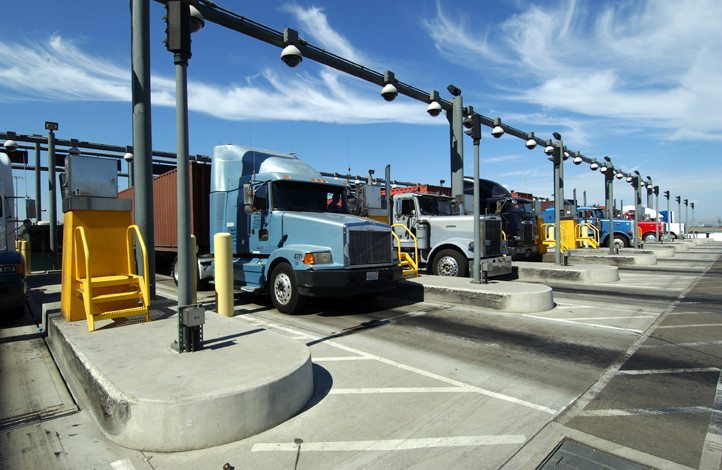

Why are the port truck drivers on strike? It is well known that the U.S. economy relies in part on jobs generated or networked around the imports of manufactured commodities. The Ports of Los Angeles and Long Beach form a nexus of the global supply chain, where multinational corporations focus on every opportunity to keep labor costs low and profits high. One of the unrecognized links in the global supply chain is the port truck driver.
Port truck drivers play a pivotal role in the distribution of goods that makes them a critical piece of the profit puzzle. Professional drivers work long hours hauling nearly $4 billion worth of cargo every day from American seaports for companies like Walmart, Home Depot, Target, Costco and Polo/Ralph Lauren. Yet they often receive paychecks below the minimum wage, and on occasion, end up owing money to the firms that hire them.
Due to the privatization policies of the Nixon-Reagan era,
» Read more about: Why They Strike: Port Truck Drivers on the Move »